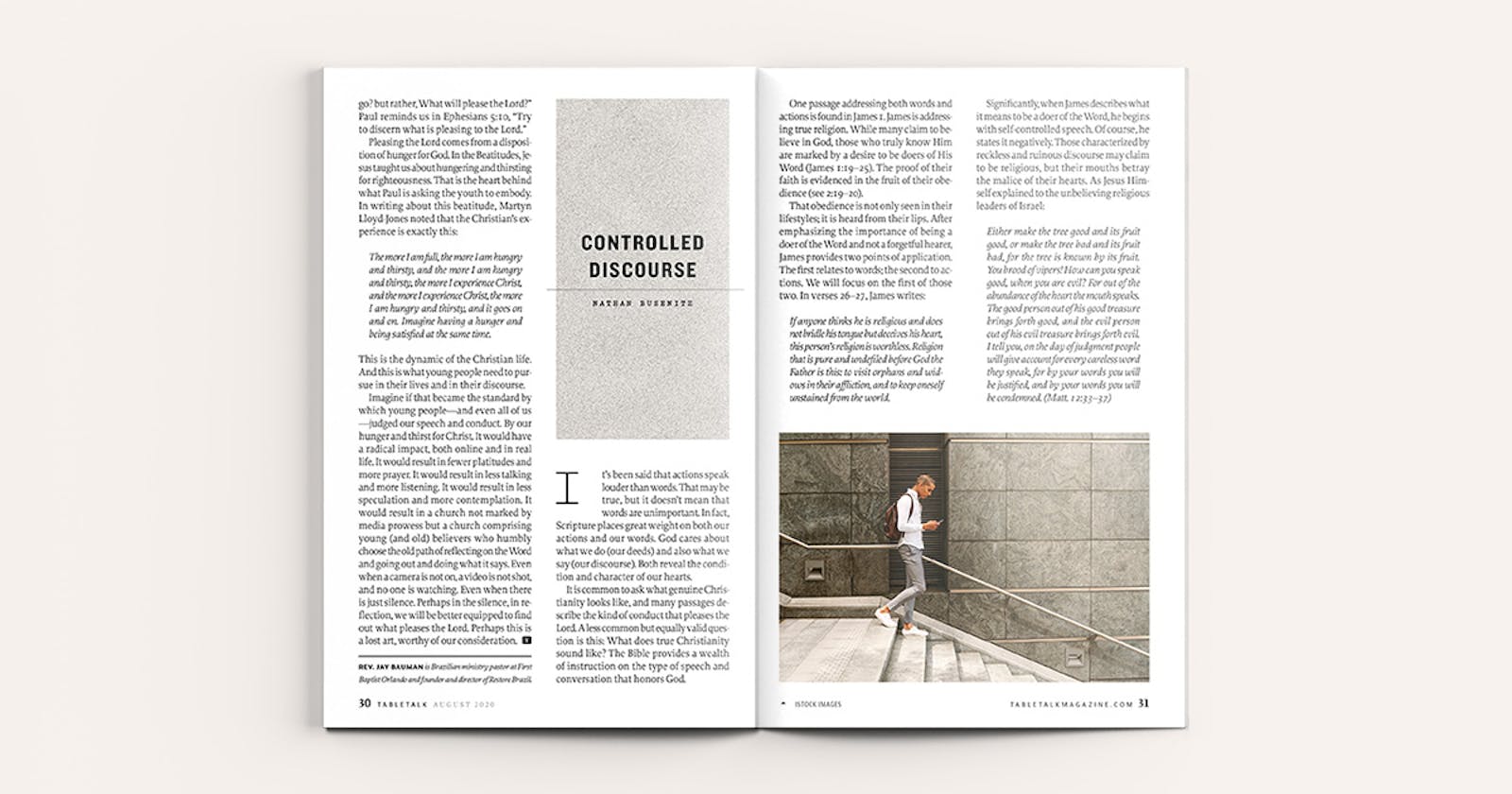
Request your free, three-month trial to Tabletalk magazine. You’ll receive the print issue monthly and gain immediate digital access to decades of archives. This trial is risk-free. No credit card required.
Try Tabletalk NowAlready receive Tabletalk magazine every month?
Verify your email address to gain unlimited access.
It’s been said that actions speak louder than words. That may be true, but it doesn’t mean that words are unimportant. In fact, Scripture places great weight on both our actions and our words. God cares about what we do (our deeds) and also what we say (our discourse). Both reveal the condition and character of our hearts.
It is common to ask what genuine Christianity looks like, and many passages describe the kind of conduct that pleases the Lord. A less common but equally valid question is this: What does true Christianity sound like? The Bible provides a wealth of instruction on the type of speech and conversation that honors God.
One passage addressing both words and actions is found in James 1. James is addressing true religion. While many claim to believe in God, those who truly know Him are marked by a desire to be doers of His Word (James 1:19–25). The proof of their faith is evidenced in the fruit of their obedience (see 2:19–20).
That obedience is not only seen in their lifestyles; it is heard from their lips. After emphasizing the importance of being a doer of the Word and not a forgetful hearer, James provides two points of application. The first relates to words; the second to actions. We will focus on the first of those two. In verses 26–27, James writes:
If anyone thinks he is religious and does not bridle his tongue but deceives his heart, this person’s religion is worthless. Religion that is pure and undefiled before God the Father is this: to visit orphans and widows in their affliction, and to keep oneself unstained from the world.
Significantly, when James describes what it means to be a doer of the Word, he begins with self-controlled speech. Of course, he states it negatively. Those characterized by reckless and ruinous discourse may claim to be religious, but their mouths betray the malice of their hearts. As Jesus Himself explained to the unbelieving religious leaders of Israel:
Either make the tree good and its fruit good, or make the tree bad and its fruit bad, for the tree is known by its fruit. You brood of vipers! How can you speak good, when you are evil? For out of the abundance of the heart the mouth speaks. The good person out of his good treasure brings forth good, and the evil person out of his evil treasure brings forth evil. I tell you, on the day of judgment people will give account for every careless word they speak, for by your words you will be justified, and by your words you will be condemned. (Matt. 12:33–37)
In James 1:26, our Lord’s half-brother reiterates that same truth. A few verses earlier, in verse 19, he exhorted his readers, “Let every person be quick to hear, slow to speak, slow to anger.” He elaborated on this point in chapter 3, using dramatic imagery to convey the destructive power of an unbridled tongue (vv. 2–12). Blazing forests, wild beasts, and bitter springs paint a vivid picture of the devastation uncontrolled discourse can leave in its wake.
A millennium before James wrote his epistle, Solomon similarly noted the destructive power of unbridled speech. Note the damage caused by destructive speech, both to the speaker and to others:
- “When words are many, transgression is not lacking, but whoever restrains his lips is prudent” (Prov. 10:19).
- “There is one whose rash words are like sword thrusts, but the tongue of the wise brings healing” (12:18).
- “Whoever guards his mouth preserves his life; he who opens wide his lips comes to ruin” (13:3).
- “A fool’s mouth is his ruin, and his lips are a snare to his soul” (18:7).
- “A man who flatters his neighbor spreads a net for his feet” (29:5).

In his first-century context, James was primarily confronting hateful and hurtful speech aimed at fellow believers, including sins such as gossip, slander, backbiting, cursing, and outbursts of anger. But an unbridled tongue can also be characterized by lying, boasting, talebearing, flattery, complaining, grumbling, and a host of other verbal transgressions. When the tongue is marked by these patterns of speech, it is evidence that the heart is unredeemed.
To be clear, sinners are not saved by cleaning up their speech or by any other good work. They are saved only by God’s grace through faith in the person and work of the Lord Jesus (Acts 16:31; Rom. 10:9). At the moment of conversion, their hearts are cleansed through the regenerating power of the Holy Spirit (Titus 3:4–7). They become new creatures in Christ (2 Cor. 5:17). Their hearts are transformed, along with their lives and their lips. Consequently, a heart changed by the truth of the gospel will inevitably bear fruit, both in words and deeds.
Believers are not perfect this side of heaven. But as a pattern of life, they are characterized by bridled speech—words that are both self-controlled and Spirit-led. As James 1:26 reminds us, that kind of controlled discourse is part of what it means to be a doer of the Word. Or to answer our question from earlier, this is what it sounds like to be a Christian.
